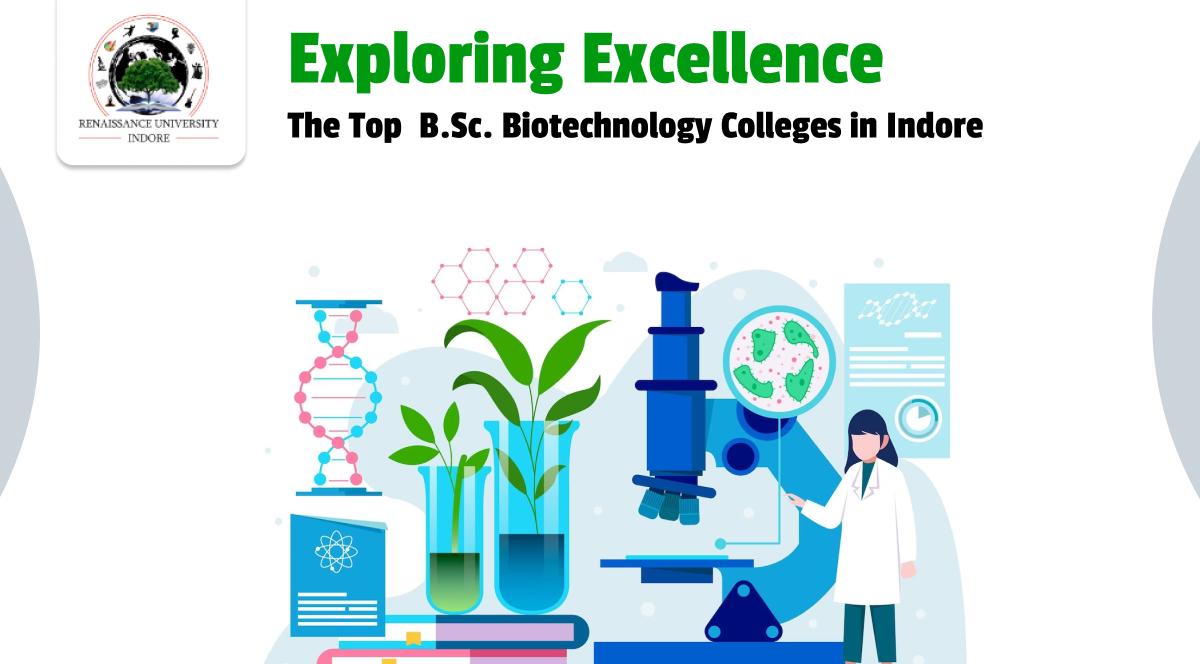B.Sc. in Biotechnology
(Introduction)
In the dynamic landscape of scientific education, the Bachelor of Science in Biotechnology (B.Sc. Biotechnology) stands as a gateway to a realm of cutting-edge advancements and transformative discoveries. This program delves into the fusion of biology, technology, and innovation, offering students a unique opportunity to explore the frontiers of genetic engineering, molecular biology, and beyond. As we embark on a journey to unravel the depths of B.Sc. in Biotechnology, we’ll uncover its significance, evolution, and the exciting prospects it holds for aspiring scientists and innovators. Join us as we delve into the intricate world where scientific curiosity meets practical applications, shaping the future of healthcare, agriculture, industry, and more.
Admission Process for B.Sc. in Biotechnology
The admission process for the Bachelor of Science in Biotechnology (B.Sc. Biotechnology) program involves several steps that pave the way for aspiring students to embark on a transformative educational journey. Here’s a comprehensive overview of the typical admission process:
1. Application Submission
Prospective students are required to submit an application to the universities or colleges offering the B.Sc. Biotechnology program. This application includes personal details, and educational history, and often requires a statement of purpose or essay highlighting the applicant’s interest in biotechnology.
2. Eligibility Criteria
Universities generally have specific eligibility criteria, which commonly include a minimum educational qualification (such as completing high school or an equivalent qualification). Certain institutions might also have prerequisites in science subjects like biology, chemistry, or mathematics.
3. Entrance Examinations
Some universities may require applicants to appear for entrance examinations designed to assess their aptitude in subjects related to biotechnology and science. These exams could cover topics like biology, chemistry, physics, and mathematics.
4. Merit-Based Selection
Institutions often utilize a merit-based selection process, taking into account the applicant’s academic performance in previous years, entrance exam scores (if applicable), and sometimes additional components like extracurricular activities or achievements.
5. Interviews or Group Discussions
Certain universities might conduct interviews or group discussions to evaluate the applicant’s communication skills, knowledge about the field, and passion for pursuing B.Sc. Biotechnology.
6. Counselling or Admission Offers
After assessing the applications and conducting any necessary interviews or discussions, universities extend admission offers to the selected candidates. Candidates who receive offers typically need to confirm their acceptance within a specified timeframe.
7. Registration and Document Verification
Once candidates confirm their acceptance, they need to complete the registration process by submitting required documents such as academic transcripts, identity proofs, and other relevant certificates.
8. Payment of Fees
Admitted candidates are required to pay the necessary tuition fees and any other charges as per the institution’s guidelines.
It’s important for prospective students to thoroughly research the specific admission process of the universities or colleges they are interested in, as requirements may vary. Keeping track of application deadlines and adhering to the submission guidelines are crucial steps to ensure a smooth admission process. As you embark on this exciting academic journey, the doors to the captivating world of biotechnology await your exploration.
Eligibility Criteria for Admission to B.Sc. Biotechnology Course
To gain admission to the Bachelor of Science in Biotechnology (B.Sc. Biotechnology) course, aspiring students need to meet specific eligibility criteria set by the respective universities or colleges offering the program. These criteria ensure that students have the foundational knowledge and skills necessary to excel in the biotechnology field. Here is an outline of the typical eligibility criteria:
1. Educational Qualification:
Prospective students should have successfully completed their secondary education or its equivalent, usually equivalent to 12 years of schooling. This might be fulfilled through high school, A-levels, or any other recognized education system.
2. Academic Background:
While specific requirements may vary between institutions, a strong foundation in science subjects is often a prerequisite. This includes subjects like Biology, Chemistry, and sometimes Mathematics or Physics. Certain universities might also consider a minimum grade or percentage in these subjects.
3. Minimum Grades:
Many institutions set a minimum grade threshold that applicants must meet in their high school or equivalent examinations. This threshold could differ based on the institution and the academic year’s competitiveness.
4. Age Limit:
There might be age restrictions for admission, which can vary depending on the university’s policies and local regulations.
5. Entrance Examinations (if applicable):
Some universities require candidates to appear for entrance examinations. These exams assess the applicant’s knowledge and aptitude in science-related subjects. The scores achieved in these exams could play a role in the selection process.
6. English Language Proficiency:
For international students or in institutions where English is not the primary language of instruction, demonstrating proficiency in English through standardized tests like IELTS or TOEFL might be necessary.
7. Other Requirements:
Depending on the university, there could be additional requirements such as a statement of purpose, letters of recommendation, or a personal interview.
It’s crucial for prospective students to carefully review the specific eligibility criteria of the institutions they intend to apply to. Meeting these criteria is the first step toward securing admission to the B.Sc. Biotechnology course. Universities strive to ensure that admitted students possess the foundational knowledge and skills to thrive in the biotechnology field, contributing to scientific advancements and innovations.
Syllabus of B.Sc. Biotechnology
The curriculum of the Bachelor of Science in Biotechnology (B.Sc. Biotechnology) program is designed to provide students with a comprehensive understanding of the intricate world of biotechnology, blending theoretical knowledge with practical applications. The syllabus encompasses a wide range of subjects that contribute to shaping future biotechnologists. Here’s an overview of the typical syllabus:
1. Semester 1: Introduction to Biotechnology
- Cell Biology
- Microbiology
- Chemistry for Biotechnologists
- Mathematics for Biotechnologists
- English Communication Skills
2. Semester 2: Biomolecules and Genetics
- Biomolecules and Biochemistry
- Genetics and Genetic Engineering
- Microbial Genetics
- Immunology
- Environmental Studies
3. Semester 3: Molecular Biology Techniques
- Molecular Biology
- Recombinant DNA Technology
- Gene Cloning and PCR
- Bioinformatics
- Plant and Animal Tissue Culture
4. Semester 4: Bioprocess Engineering
- Bioprocess Engineering and Bioreactors
- Downstream Processing
- Enzyme Technology
- Biostatistics
- Analytical Techniques in Biotechnology
5. Semester 5: Medical Biotechnology
- Introduction to Medical Biotechnology
- Biotechnology in Medicine and Healthcare
- Pharmaceutical Biotechnology
- Medical Diagnostics and Imaging
- Bioethics and Intellectual Property Rights
6. Semester 6: Industrial and Environmental Biotechnology
- Industrial Biotechnology
- Fermentation Technology
- Bioremediation and Waste Management
- Food and Beverage Biotechnology
- Project Work
7. Semester 7: Genomics and Proteomics
- Genomics and Functional Genomics
- Proteomics and Protein Engineering
- Bioinformatics in Genomics
- Nanobiotechnology
- Elective Course
8. Semester 8: Electives and Research Project
- Elective Courses (e.g., Agricultural Biotechnology, Immunotechnology)
- Research Project in Biotechnology
- Entrepreneurship in Biotechnology
- Current Trends in Biotechnology
9. Soft Skill Development: Throughout the Curriculum
- Communication Skills
- Teamwork and Collaboration
- Problem-Solving and Critical Thinking
- Leadership and Management Skills
The syllabus is carefully structured to provide students with a balanced blend of fundamental concepts, advanced techniques, and specialized knowledge within various branches of biotechnology. Practical sessions, laboratory work, and projects are integral components of the curriculum, allowing students to gain hands-on experience and hone their skills. Through this holistic approach, the B.Sc. Biotechnology program equips students with the tools they need to contribute to scientific breakthroughs and innovations in the field.
The Multifaceted Fields of Biotechnology
Biotechnology has emerged as a multidisciplinary field that spans various sectors, each harnessing the power of biological processes to drive innovation and transformation. In this section, we delve into the diverse realms that biotechnology encompasses, showcasing its wide-ranging applications and impact:
1. Medical Biotechnology: Innovations in Healthcare
- Genetic Testing and Diagnostics
- Biopharmaceuticals and Drug Development
- Regenerative Medicine and Stem Cell Therapy
- Gene Therapy and Personalized Medicine
2. Agricultural Biotechnology: Revolutionizing Crop Production
- Genetically Modified Organisms (GMOs)
- Crop Improvement and Yield Enhancement
- Pest and Disease Resistance in Plants
- Sustainable Agriculture Practices
3. Industrial Biotechnology: Transforming Manufacturing Processes
- Enzyme Engineering for Industrial Applications
- Bioplastics and Biofuels Production
- Industrial Fermentation and Bioreactors
- Bio-based Chemicals and Materials
4. Environmental Biotechnology: Sustainability and Conservation
- Bioremediation of Polluted Environments
- Microbial Fuel Cells for Energy Generation
- Biological Waste Treatment and Recycling
- Biodiversity Conservation through Biotechnology
5. Food and Beverage Biotechnology: Enhancing Nutrition and Flavor
- Nutraceuticals and Functional Foods
- Fermentation in Food Production
- Food Safety and Quality Control
- Genetic Enhancement of Crops for Nutritional Value
6. Bioinformatics: Merging Biology and Data Science
- Computational Biology and Genomic Analysis
- Protein Structure Prediction
- Data Mining for Drug Discovery
- Systems Biology and Network Analysis
7. Nanobiotechnology: Integrating Nanotechnology with Biology
- Nanomaterials in Drug Delivery
- Nanoscale Imaging Techniques
- Nanosensors for Disease Detection
- Applications in Biomedical Engineering
8. Biotechnology in Space Exploration: Beyond Earth’s Boundaries
- Microbial Life Detection on Other Planets
- Bioregenerative Life Support Systems
- Genetic Adaptation of Organisms to Space Conditions
- Biotechnology’s Role in Sustaining Long-Duration Space Missions
These multifaceted fields highlight the versatility of biotechnology, revealing its role in addressing global challenges, improving human well-being, and shaping the future of various industries. As we continue our exploration, we’ll delve deeper into the educational and career opportunities that B.Sc. in Biotechnology offers in these exciting domains.
Career Prospects in Biotechnology
The world of biotechnology presents a myriad of career opportunities that cater to diverse interests and skills. As graduates of the Bachelor of Science in Biotechnology (B.Sc. Biotechnology) program, individuals are well-equipped to venture into various sectors that harness the power of biological innovation. Here’s a glimpse into the wide range of career prospects that await aspiring biotechnologists:
1. Research Scientist
- Conduct cutting-edge research in laboratories or research institutions.
- Explore advancements in genetics, molecular biology, and bioinformatics.
- Contribute to scientific publications and breakthrough discoveries.
2. Bioprocess Engineer
- Optimize bioreactor systems for the production of pharmaceuticals and biofuels.
- Design and develop efficient processes for biomanufacturing.
3. Medical Scientist
- Focus on medical research, working on drug development, clinical trials, and diagnostics.
- Explore areas like gene therapy, personalized medicine, and regenerative medicine.
4. Pharmaceutical Sales Representative
- Bridge the gap between pharmaceutical companies and healthcare professionals.
- Educate healthcare providers about new drugs and therapies.
5. Quality Control Analyst
- Ensure the quality and safety of biotechnological products through rigorous testing and analysis.
- Play a crucial role in maintaining regulatory compliance.
6. Bioinformatics Specialist
- Combine biology, computer science, and data analysis to interpret biological data.
- Work on genome sequencing, protein structure prediction, and systems biology.
7. Environmental Biotechnologist
- Focus on solutions for environmental challenges, such as bioremediation and waste management.
- Contribute to sustainable practices in industries.
8. Agricultural Biotechnologist
- Develop genetically modified crops for improved yield and resistance to pests.
- Contribute to global food security and sustainable agriculture.
9. Biotechnology Consultant
- Provide expertise to industries, government agencies, or research institutions.
- Offer insights on technical, regulatory, and ethical aspects of biotechnology.
10. Entrepreneur in Biotech Startups
- Transform innovative ideas into viable biotechnology businesses.
- Explore areas like biotech innovations, medical devices, and sustainable solutions.
11. Academician/Professor
- Pursue further studies and research as a postgraduate student.
- Teach and mentor students in academic institutions.
12. Science Communicator/Technical Writer
- Translate complex scientific concepts into accessible content for the public.
- Work as science journalists, bloggers, or technical writers.
13. Regulatory Affairs Specialist
- Navigate the intricate landscape of biotechnology regulations and approvals.
- Ensure products comply with local and international regulations.
The world of biotechnology is dynamic and ever-evolving, offering individuals the chance to contribute to groundbreaking innovations that impact human health, the environment, and industries at large. With a B.Sc. Biotechnology degree, graduates possess the skills and knowledge to excel in these diverse roles, shaping the future of science and technology.
B.Sc. ( Biotechnology) Colleges in Indore
Indore, a city known for its educational institutions, offers several esteemed colleges where students can pursue a Bachelor of Science in Biotechnology (B.Sc. Biotechnology) degree. These colleges provide a strong academic foundation and practical exposure in the field of biotechnology. Here are some notable colleges in Indore that offer B.Sc. Biotechnology programs:
- Renaissance University (RU)
- Offers a comprehensive B.Sc. Biotechnology program.
- Provides modern laboratories and research facilities.
- Focuses on hands-on training and research projects.
- Prestige Institute of Management and Research (PIMR)
- Offers a B.Sc. Biotechnology program with a strong emphasis on research.
- Provides interdisciplinary learning and exposure to industry practices.
- Engages students in workshops and seminars with experts.
- Acropolis Institute of Pharmaceutical Education and Research
- Offers a B.Sc. Biotechnology program with a holistic approach.
- Emphasizes practical training and industry interactions.
- Provides opportunities for internships and projects.
- Malwa Institute of Science and Technology (MIST)
- Offers a B.Sc. Biotechnology program with a practical-oriented curriculum.
- Focuses on skill development and industry relevance.
- Offers exposure to emerging trends in biotechnology.
- Medi-Caps University
- Offers a B.Sc. Biotechnology program with a blend of theory and practice.
- Provides exposure to laboratory techniques and modern equipment.
- Encourages students to participate in research projects.
When considering colleges, it’s advisable to research each institution’s admission criteria, faculty expertise, infrastructure, and placement opportunities. The B.Sc. The biotechnology program at these colleges equips students with the skills and knowledge required to excel in the dynamic field of biotechnology.
Conclusion
As we reach the culmination of our exploration into the captivating world of B.Sc. in Biotechnology, it’s evident that this educational pathway offers a gateway to unparalleled opportunities for scientific discovery, innovation, and impact. The program unravels the mysteries of genetics, cellular processes, and cutting-edge techniques, preparing students to be the next generation of biotechnologists who shape the future.
From deciphering the intricacies of molecular biology to envisioning sustainable solutions for global challenges, B.Sc. Biotechnology fosters a deep understanding of the biological world and its intersection with technology. Graduates are empowered to contribute to medical breakthroughs, agricultural advancements, environmental preservation, and numerous other fields that rely on biotechnological innovation.
The journey through the comprehensive curriculum, practical laboratory experiences, and exposure to diverse disciplines equip students with not only academic knowledge but also critical thinking skills, problem-solving acumen, and the ability to collaborate across multidisciplinary domains. As you embark on this transformative educational journey, remember that the horizons of biotechnology are boundless, and your contribution has the potential to reshape industries, improve lives, and drive the progress of society.
The B.Sc. in Biotechnology program opens doors to a world of opportunities, where scientific curiosity meets real-world applications. Whether you aspire to be a research scientist, a bioprocess engineer, a healthcare innovator, or a visionary entrepreneur, your journey starts here, guided by the foundational knowledge and skills gained through this remarkable educational endeavor. Embrace the challenges, seize the opportunities, and prepare to make your mark in the dynamic landscape of biotechnology.






